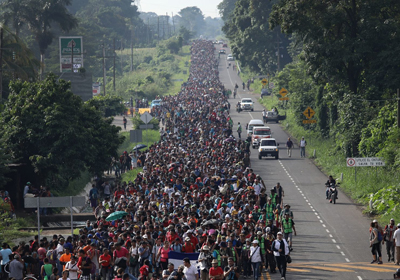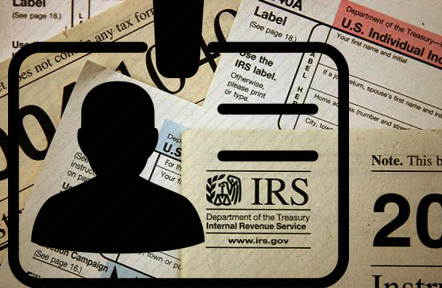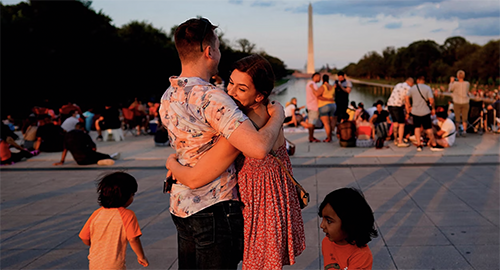Immigration Politics Is About Perceptions of Control, Not Immigration Policy
 Many major political changes over the last few years are related to immigration. From the rise of Eurosceptic political parties in Germany, France, Italy, and elsewhere, to Brexit, and the U.S. election of Donald Trump, many political commentators are blaming these populist and nationalist political surges on unaddressed anti-immigration sentiment among voters. Although anti-immigration opinions certainly have a role to play in those political upsets, voter feelings of chaos and a lack of control over immigration are likely more important.
Many major political changes over the last few years are related to immigration. From the rise of Eurosceptic political parties in Germany, France, Italy, and elsewhere, to Brexit, and the U.S. election of Donald Trump, many political commentators are blaming these populist and nationalist political surges on unaddressed anti-immigration sentiment among voters. Although anti-immigration opinions certainly have a role to play in those political upsets, voter feelings of chaos and a lack of control over immigration are likely more important.
President Trump focused his campaign on the “build the wall” chant that capitalized on the perception of chaos at the southwest border where the worst from Mexico were supposedly crossing. His campaign platform called for cutting legal immigration, mandating universal E-Verify, and many of the other bells and whistles demanded by restrictionists over the years, but “reduce legal immigration” never became a chant because it doesn’t play on the perception of immigration chaos that fueled his political rise.
The theory is that the perception of greater chaos and less control over immigration leads to opposition to immigration, even the legal variety, and greater political support for harsh repressive methods. Images of Syrians arriving by the boatload and illegal immigrants scaling border walls or walking through the desert spread the perception that immigration is out of control and that crackdowns are needed to regain control. Consequently, few people want to liberalize immigration when there’s a crisis.
As long as many people perceive chaos at the border then anti-immigration appeals will have an effect greater than the share of nativists in the electorate, as I wrote about here. The key idea here is “perception.” The number of people crossing the border illegally is down dramatically since the Bush years, the Border Patrol is much larger, homicide rates on the border are down, but those trends don’t seem to matter so long as the perception of chaos remains.
At this point, the question for supporters of liberalized immigration is: Why not give the other side a border wall and other enforcement schemes? That could decrease chaos and build support for future immigration liberalization. The downside to that is that more enforcement would make known additional illegal actions on the border and, thus, could increase the perception of chaos. Even if a border wall reduced illegal entry by 90 percent, a border wall would ensure that 100 percent of the remaining entries would be recorded and broadcast to a public that would perceive more chaos than ever before even though the amount of illegal immigration is radically reduced.
Immigration politics in foreign countries support the perception of chaos and lack of control theory. Canada is considering an increase in legal immigration and the Australian government is considering a decrease as a way to cope with their absurdly restrictive land ordinances in Melbourne and Sydney. Importantly, the proposed policy reforms in both countries are moderate, not the result of an election but of gradual reform, and aren’t supported by recent massive changes in public opinion. In Britain, public worries about immigration diminished substantially after the Brexit vote either because the public thought that they regained control of the border through Brexit or because the surge of Syrian refugees abated.
If the above theory is true, where does this leave us?
First, it means that many types of immigration argument and analysis will be unlikely to politically solving the problem with exceptions for research that diminishes the perception of chaos. Arguments over the skill mix of immigrants, the assimilation of the second generation, or the fiscal effects don’t change opinions. Those issues matter for the real-world effects of immigration, of course, but they do not much affect the political debate.
Second, ignorance is the main roadblock to a more liberalized immigration policy. In all Western countries, respondents greatly exaggerate the size of the foreign-born population. The more ignorant respondents are more anti-immigration. Those levels of ignorance likely extend to ignorance of the actual levels of immigration enforcement and chaos. If there is a poll out there asking Americans about whether there should be more immigration enforcement as well as asking them about what they think the current level is, my bet is that there’d be a strong correlation between those who say there is no enforcement and that the government needs to cut immigration.
Third, this means that those of us who favor liberalized immigration should especially favor reforms that reduce the perception of chaos. Thus, reforms that prevent caravans, illegal immigrants scaling border fences, and asylum seekers in prison cells should be adopted.
Fortunately, there are many reforms that liberalize immigration and reduce perceptions of chaos. Allowing more low-skilled immigrants in on temporary work permits would reduce the number of illegal immigrants crossing the border. Asylum seekers cannot apply from their home countries, perhaps allowing them to do so before coming here will help reduce the number of caravans. Private refugee or humanitarian sponsorship would also take the pressure off border personnel. Limiting the possibility of border detention to only serious potential security risks will reduce the perceived chaos and criminality. Opposing a border wall and the hiring of additional border patrol agents will reduce the opportunities for interactions with border crossers and cut the opportunities for reported illegal activity.
If the perception of chaos/control thesis is correct, this means that efforts such as the RAISE Act and broader efforts to increase “merit” based immigration at the expense of lower-skilled immigration will not be politically effective.
There is enough immigration research to fill libraries. That research has undoubtedly affected the opinions of the public and shaped elite opinion about immigration policy, but additional increases in public support for liberalized immigration may only come when the public is convinced that immigration is under control and when it perceives the system as less chaotic. Despite the current elections of politicians and political parties opposed to immigration, public opinion is moving in a more pro-immigration direction. Perceptions of control and order will push support over the line.








